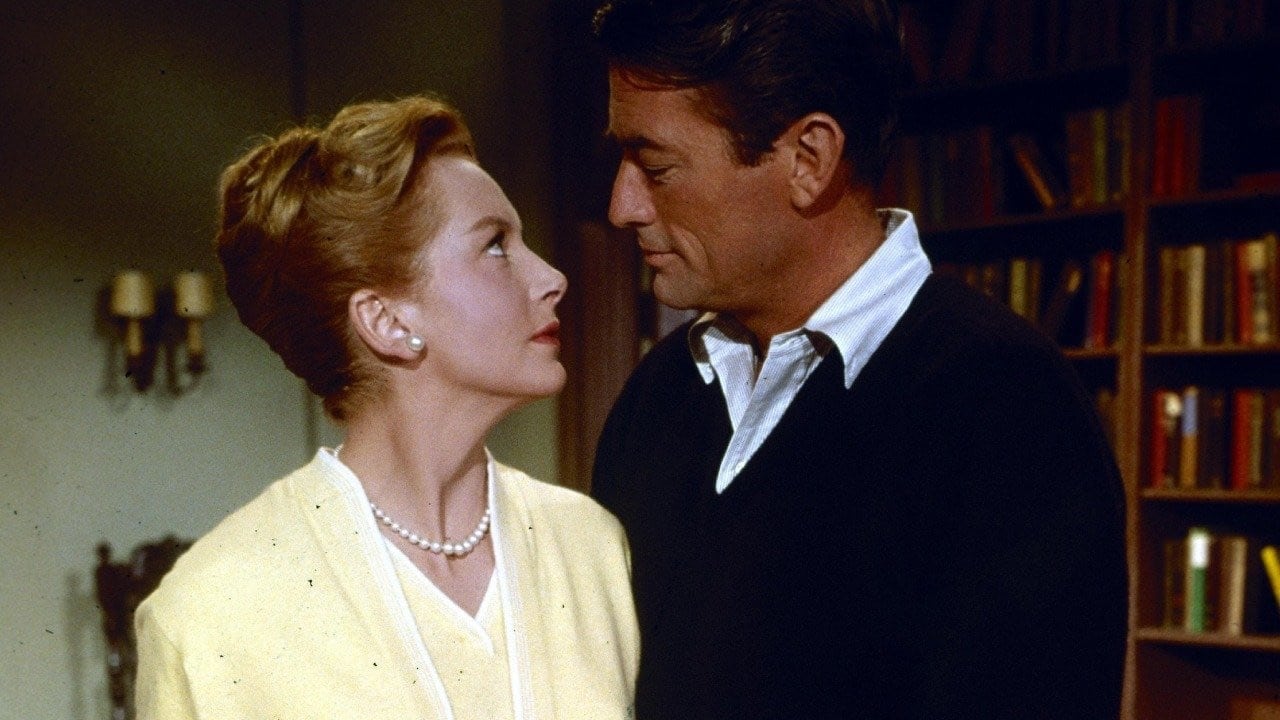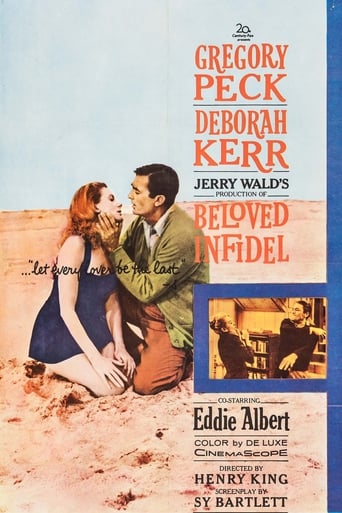

Beloved Infidel is the story of the real life romance between Hollywood gossip columnist Sheilah Graham (Deborah Kerr) and legendary writer F. Scott Fitzgerald (Gregory Peck). It is based on Graham's autobiography and the story is definitely told through her eyes. Plain and simple, the story is a soap opera and the quality of writing fits it. For a story about two professional writers, the script fails to properly develop the characters. Graham has one scene about 40 minutes in when she opens up a reveals the truth about herself, but it is not built on and scarcely mentioned again as the story transitions to a focus on Fitzgerald's drinking, which comes out a left field.Kerr gives a good performance given how little she has to work with, and Peck tries his best to match her. However, Peck is a little miscast in this role as the emotionally troubled Fitzgerald. In between well done emotional outbursts, Peck reverts to his traditional stoicism, which works well in many of his other roles, but feels slightly out of place here. There is also a surprising no appearance by or hardly a mention of Fitzgerald's wife, Zelda. A fascinating person who at this point in her life was in a sanitarium. That is just one example of Graham's influence on the script, keeping the focus off of her lover's wife. Ultimately, Beloved Infidel is probably not worth your time unless you are a big fan of F. Scott Fitzgerald or Deborah Kerr.
... View MoreDeborah Kerr and Gregory Peck are Sheilah Graham and F. Scott Fitzgerald in "Beloved Infidel," based on Sheilah Graham's autobiography. 20th Century Fox gave this a big, glossy production, with Henry King as director.In the movie, Sheilah goes to the set of In Old Chicago with one "Mr. Harris" (Zanuck) and we see an actual scene from the film re-enacted. Graham has apparently criticized the actress Jane Pierce (Alice Faye) and Miss Pierce isn't happy to see her. In the cafeteria, there is a large photo of Shirley Temple, and next to her is Tyrone Power. Yes, we're at Fox, all right.Graham is an aspiring writer looking for work, and at a party, she meets F. Scott Fitzgerald, who has come out to Hollywood and is writing screenplays. The two fall in love. Zelda, Scott's wife, has been institutionalized by then, and his daughter Francis is in school. Fitzgerald needs the film work to pay his bills.History tells us that Fitzgerald was a big flop writing for movies; most of his work is uncredited or just not used. His glorious prose did not translate to the screen. In this version of his story, he starts drinking heavily after he is fired from the studio. In reality he had been an alcoholic since college. The alcohol temporarily breaks them up.Certainly one of the most fascinating people who ever lived is F. Scott Fitzgerald, and Sheilah Graham pulled herself up from nothing to become an important columnist. But neither of these people come off as especially fascinating or interesting.For me, Gregory Peck was miscast as Fitzgerald, whom I believe was, for one thing, much less robust, had a weaker character, and was probably drunk most of the time. Peck does as well as he can, but I think he was smart enough to know there was no way he could convey the personality of the real Fitzgerald. It wasn't in the script. Deborah Kerr, in my opinion, was an underrated actress, and she gives a marvelous performance here. But she probably wasn't playing Sheilah Graham.The script simply isn't specific or detailed enough to give us an idea of who these people really were.People have speculated how much of this story is true. Most of it - Fitzgerald did move to Hollywood, he did flop out in movies, he did fall for Sheilah Graham, they did live together, he did start to write The Last Tycoon; the incident toward the end of the movie at the theater did happen, and the end of the film was basically correct. As far as what they were both like -- you'll have to find another source for that.
... View MoreThere is a scene in this film at about the 42 minute mark that is among the worst I have seen in some time. As F. Scott Fitzgerald (Gregory Peck) and Sheilah Graham (Deborah Kerr) are lounging on the beach, suddenly things become tense and Sheilah begins to cry--at which point she tells her lover about her sordid past. This "dramatic scene" becomes so terribly overdone and histrionic I couldn't help but turn to my wife and exclaim how stupid it all was...as dramatic music swelled on the television as it all came to a phony crescendo. NO ONE experiences moments like this--no one. Now how much of the rest of the film is true, I cannot say, but this particular moment was laughably bad and as fake as an $8 Rolex--and leads me to assume that some of the other reviewers were correct--the film is a lot of bunk. However, I am not an expert on the life of these two people and the internet didn't seem to clear this up, either. Just who were F. Scott Fitzgerald and Sheilah Graham and what was their relationship really like? What I do know about Fitzgerald, however, does seem different from what I saw in the film. Was he the suave and decent man we initially see in the film? Well, considering he was married at the same time he was carrying on with Graham and drank like a fish, I'd assume he wasn't. Was he as obnoxious and boorish as we later see in the film? Perhaps, but if he was this bad AND yet Ms. Graham stayed with him, then this makes her out to be a complete dummy--and not someone you'd like to see featured in a film. And, if he wasn't, then the film does a poor disservice to his memory. Either way, it made for a painful and not particularly pleasant viewing experience.The sum total of this film appears to be a tale of two not particularly likable or healthy people. In a dark and salacious way, some might find this all very entertaining, but most are sure to see this as a train wreck with no surprises along the way! Unpleasant but with glossy production values (especially the music, which was lovely but way over the top) it begs the question "why did they even choose to make this in the first place?". The bottom line--it's a pretty bad film all around and probably not worth your time--even if, like me, you are big Gregory Peck fan.
... View MoreI thought it was fun. The acting was captivating to me. But I missed the beginning and the end. I wonder if they lived happily together for a long time. I thought the Last Tycoon was a great movie. Didn't the New York Publishers give him the advance he wanted? ; ) You think he drank too much? She was sort of a party pooper wasn't she?
... View More